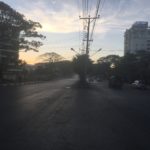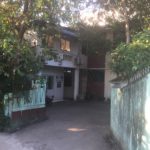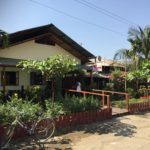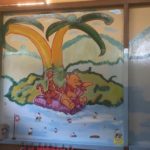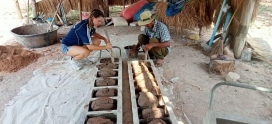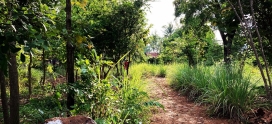Ed Wilkins in Myanmar- Week 22
Although blogs have an unerring tendency to focus on the important, unusual, or amusing, it’s the everyday mundane ones that I probably will remember most fondly when I do eventually draw an unhappy line under this wonderful chapter of my never-ending career and move on to greener pastures.
So, just in case I forget (which you will realise by now is a real possibility) here are a few key moments that start everyday:
After drenching myself in anti-mosquito repellent, the 6.30 am 20-minute walk to the Office is about the only time you can traverse the road checking your e-mails without fear of being mowed down by somebody on wheels probably going the wrong direction, and this time of year it’s lovely and cool (picture 1).
This is followed by a friendly face and a peaceful cup of coffee at the head office (picture 2) while downloading e-mails and the daily Times (a luxury I allow myself) before the 7am pick-up on the 90-minute ‘ferry’ journey to the clinic (picture 3) – not my favourite pastime but this is when I catch up on the sport and try unsuccessfully to get a few answers to the cross-word!
Once you arrive to what must be one of the most welcoming exteriors to a medical facility anywhere (picture 4) as well as a friendly leg-tripping attempt from the menagerie of animals that guard the clinic, there is black tea and the Burmese doctors dig into enough food to last me for a week, let alone till lunch- and all this before clinics start at 9am.
After a gruelling day, the return journey starts at around 5.30pm and takes a couple of hours so days are long and when it’s hot like now, sweaty and exhausting. But it’s a round trip that I’m sure brings back memories for any volunteer who’s walked these MAM clinic bamboo floors at some time.
Probably more so is the refreshing tepid shower followed by a cold Myanmar beer, hopefully on exclusive offer.
I suppose, part of the reason for me describing this is to remind myself in later years that I turned the full circle from a jobbing junior doc, through the exalted ranks of pompous consultant revelling in the teaching ward rounds and opportunities to get a friendly one over on my colleagues and junior staff in quoting sentinel research etc., to back where I am now: effectively a jobbing junior doc again but with a little extra knowledge acquired over the 40 years which I hope is useful to everyone here! I wouldn’t call it closure on a career exactly but, certainly, it’s starting to have a neat feel to it!
However, back to business.
Clinically it’s doesn’t change much – patients falling into the sick, very sick, or too scary sick for a little clinic to be carried through the door. Because I’m off to Uganda to help in a rural paediatric hospital in a few weeks with my wife, I thought I better brush up on seeing kids and so here’s the list from yesterday: 7 scabies (one very nasty secondary infection to boot); 6 kids vertically infected with HIV ranging from one to 12 – one naïve; one being sent to a ‘mother home’ as they’re called here for what is effectively DOT (that is Directly Observed Therapy) because of terrible proxy adherence; one switched to second line therapy (which here is boosted lopinavir with Combivir for those in-the-know medics amongst you) for the same reason; and three cheerful Charlie’s and Charlotte’s with complete control of their virus.
Now, it’s inevitable that the HIV will become resistant to the drugs if they’re not being given or taken correctly and that unfortunately is the case because of families fractured by HIV in that middle generation: both mum and dad having died and the offspring being cared for usually by grandparents. This missed generation is true of all LMIC countries where the drugs were late in being introduced.
Hence, teaching the carers about the virus and the drugs is critical and the counsellors here are truly brilliant, in fact some of the most efficient I’ve ever come across. And at the clinics they are invested in. A counsellor for every doctor that’s working in the clinic – not something you’d see funded in the UK. They also take on the tricky area of disclosure: partial at eight, and full at twelve.
Returning to the clinic, the rest was coughs, colds, diarrhoea and the usual stuff. Interestingly, the kiddies room is adorned with AA Milne on the walls (picture 5) but no-one knows who Winnie the Pooh, Piglet, or Tigger are (apart from me obviously!). Not so in China, where the books have been banned because they have been used to ridicule the country’s leaders which, understandably I suppose for China, has somewhat irked the censors. Poor old Winnie!
From a professional angle, I popped in to the MRC conference last week – Myanmar (not Medical) Research Council – where we had a poster on our HIV data. But a far more interesting one that caught my eye which would not be a likely topic for study in the UK, was a study of deafness in the military where over one-third of those firing weapons experienced significant hearing loss; unsurprisingly, the closer you were to the firing and the longer you’d been standing there, the higher your risk!! Few of the soldiers wanted to wear hearing aids though. Bit worrying if you think about it: they have the gun, you’re in the line of fire, you’re attempting at rationally explaining why you’re not the enemy, and they’re deaf! Anyway, the second professional contact was my ex-senior registrar (of course now a super-awesome consultant) who had come over as part of a team from the joint Royal college of physicians to train doctors wanting to sit the UK MRCP exams.
Now, I have my considerable reservations about this because it costs an enormous amount of dosh just to attend the ‘how to do it’ sessions, let alone the ‘doing-it’ bit – in fact, about half their annual salary in total. But the rewards are high, though it often means continuing their career out of the country and, alas for some, being tempted never to return to Myanmar to work. And boy, are they needed here. I could say the same for any soul reading this and searching for something worthy to do for a few months. I’ll say it again as I have in every blog – everyone has something to offer and the reward for you is enormous. There’s not been a volunteer I can remember in the last year who doesn’t want to return as soon as they can. And whatever your skill-set, it is needed believe me, because if nothing else, it will come with oodles of enthusiasm and a passionate and committed desire to help. But back to the RCP crew, I have no real right to be critical. It’s an over-subscribed popular course and they’re an excellent bunch of teachers, and I also got an expensive meal out of them gratis.
I’d like to say that I’ve been dedicating myself to work as always, but that’s not completely true though. I went to my very first ‘pool party’ with my flat mate – half my age – and the nurse who glued my head together – just over a third my age. As a surrogate parent, my excuse was to soak in the pool to soothe my fractured/bruised rib, but it was an interesting experience to see how the ex-pat youth live – my age-related deafness was incredibly helpful with the unnecessarily loud music. An unexpected bonus was the sunset view (picture 6).
I’ve undoubtedly been shown up by the other Green Shoots volunteer working here who’s showing her true caring colours by helping the Burmese with conversational classes, cleaning up their streets, and assisting in the food kitchens. She also drinks water not beer! Oh dear, next week maybe!


